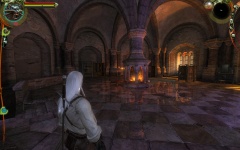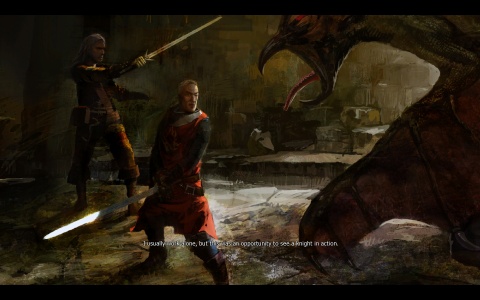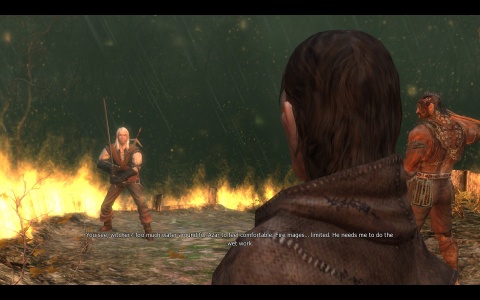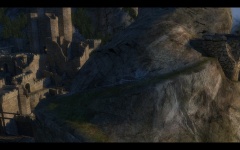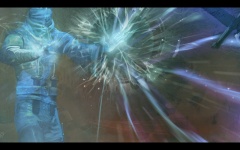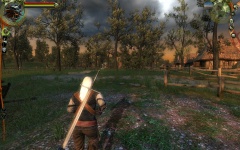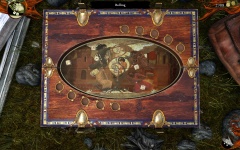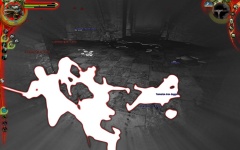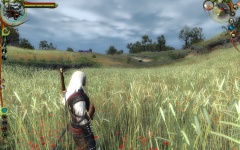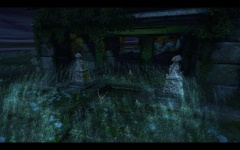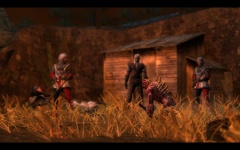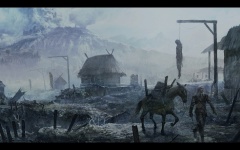The Witcher
| The Witcher | |
|---|---|
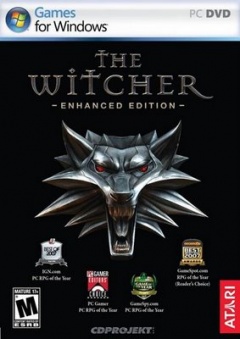 |
|
| Platforms | Windows |
| Genre | Mercenary garden picking |
| Score | 6.5  |
| Buy from Amazon | |
Very rarely do developers aim to make AAA PC exclusives anymore. As one of the most well regarded action-rpgs in recent history and aided by numerous recommendations, I felt it was my duty to try The Witcher. Its developer, CD Projekt, is a Polish firm who's been translating and publishing PC games since the mid-90s. Recently they've been spending money to expand, opening up the RED STUDIO for game development and creating Good Old Games as a DRM-free retro gaming service for modern computers.
So far, only The Witcher and its sequel have been released by the studio, with Witcher coming out in October 2007 and Assassins of Kings hitting just two months ago (in May 2011). These projects are large in scope, using source material from a Polish novel series and brought to life by large development teams. The Witcher immediately brings a fresh start to the tale as our hero Geralt mysteriously reappears with amnesia, after apparently being killed by an angry mob. So let's see how this story goes. I'm playing the latest version, the Enhanced Edition Director's Cut.
We begin the game in an old Witcher stronghold, a breeding ground for Witchers. These are individuals who willingly put their bodies and minds on the line through consumption of mutagens for an opportunity at superhuman abilities. They become stronger, with better reactions, disease immunity and the ability to learn magic. In exchange, most of them die during preparation, and all become infertile. Commonly known as monster slayers, Witchers are a source of controversy in their world, despite taking a philosophical stance of neutrality. As the story begins, a public backlash has nearly wiped them out. Only a few remain, temporarily bolstered by Geralt's return from the dead.
All in all, The Witcher powers through five chapters, a prologue, and an epilogue, each of them self-contained in a region. The prologue teaches you basics of play. Chapter one holds your hand through basic questing along with item and skill manipulation. Chapters two through five run similar with a main storyline supplemented by a massive amount of sidequests. I don't mind the chapter setup, and it seems to work well with story constraints. However, the sheer number and repetition of sidequests quickly turns grating. For example, each chapter has a number of basic bounty "kill" quests: bring me five wolf paws and I'll give you some gold. For each of these, you need to first learn about the target enemy to be able to obtain the items (typically through purchasable lorebooks) and then you must head out to get the kills. Each chapter also has two "rare monster" bounties, all of which are required to obtain the best weapon in the game. Then you also have tooth collections (for the other best weapon in the game), romance card collections, poker, fist fighting, and all the other sidequests that are around. This is for each chapter. I became significantly bored by the end of the second chapter and stopped playing completely for a while during the fourth because of the drudging repetition. Certainly many of the quests can be skipped, but oftentimes it's hard to tell which is a sidequest and which is part of the main story. This would be good if the quests had more variety and less fetching. If they had say, cut out the basic bounties and fist fighting (neither of which were particularly entertaining), the game pace would have been vastly improved. That along with limiting backtracking and/or creating run speed potions would have gone a long way.
Despite these annoyances, the other elements of The Witcher were solid enough to keep around. Fighting, despite being rather simple and having annoyances of its own, felt generally fun and seemed to do a good job of masking its basic nature. Geralt attacks enemies in a few different ways, but with only one weapon unsheathed at a time. These togglable weapons include his steel sword (effective against humans), his silver sword (effective against monsters), and up to three other weapons for specialty purposes. Switching between weapons is easy enough, with each weapon corresponding to a nearby hotkey. Fighting a shielded human? Switch to a disarming axe. Once disarmed, swap again to your steel sword for the kill. All weapon attacks are performed by left mouse, which can be chained for combos. As you left-click an opponent in range, Geralt starts his autoattack. Once the primary attack is near completion, players receive a visual notification to click again. If timed correctly, Geralt will continue his combo in a new animation for faster and heavier damage, up to five or so chains before it resets. For steel and silver swords (the witcher weapons), Geralt is able to use three different stances. A heavy stance for slower enemies, a quick stance for nimble enemies and a group stance, to cleave several at once. Magic is performed by the right mouse button. Again, he has multiple hotkeyed spells at his disposal, which include a knockback, fire, barrier spells and more. Spells can be enhanced by charging in place for added effect. During combat, Geralt is also able to perform some sorts of dashing and evade maneuvers by using movement buttons, but these are very awkward and honestly, completely unnecessary for play (at least through normal difficulty). With the variety of weapon options and stance changes along with magic, the auto-attacking becomes more interesting, and combat on its own becomes fun enough. Unfortunately, the in-combat and out-of-combat triggers seem quite sluggish, along with weapon switching at times. This puts a damper on the otherwise workable combat.
As far as presentation, The Witcher is generally solid. Many environments appear lush, with quality scenery and landmarks. Character models, especially the primary characters, are top-notch. Music, sound and quality directing contribute positively to this tale, as do the chapter-break and "story moment" drawn stills. The only parts that seem "off" are the opening and closing fmvs. Technically, the game works well enough, but I expected a bit more. It's not terribly well optimized, for either processor or graphics card. The outside environment of one entire chapter brings the engine to its knees with overly aggressive npc numbers and buildings. Non 16:9 resolution users may also encounter visibly distracting cutscene scaling lines as I did. Cutscenes are meant to run at 16:9, so while playing on say, 16:10 resolutions, the full screen is rendering 16:9 ratio images at the 16:10 resolution and then poorly scaled down, creating noticeable lines across the screen. This effect goes away if you turn down lighting, but it's still bizarre as to how the problem was still in the game. Supposedly The Witcher was very buggy on release, yet some problems still remain. I also needed to purge my save folder multiple times as the number of saves quickly overran the amount that their I/O engine was comfortable with, making saving and loading take orders of magnitudes longer than they should. Again, encountering a problem you don't expect to have to fix. The interface does its job, but I would have gladly accepted an overhaul of the item system. For a game that requires you to keep seemingly entirely random items for quests and tasks in the future, the limited inventory space just does not work. Inventory shuffling and selling is just not fun, especially when you don't know what's useful vs what's not. The entire world is full of pickable herbs and each enemy drops its own unique items as space quickly becomes limited. At least we have a bank in the current version of the game to help a little. On initial release, players had no such luck.
The story and story presentation is certainly one of the better reasons to make it through the game. The story moves a bit slowly (note the sidequest issue above), but continues to make significant progress up to its conclusion. Although Witcher "neutrality" has been around for a while in the wrpg world, player decisions matter more and in more varied ways than they do in almost all similar games I've played. This definitely keeps the game fresh and encourages an extra playthrough to find out what the other paths would hold. The Witcher also definitely pushes the adult envelope, adding language, sexual content and plain matter-of-fact speech that you wouldn't expect to find. Again, somewhat a trope of the wrpg genre, but also done in a believable manner.
To sum, the Witcher is a solid addition to the PC action-rpg/wrpg space, and it should be able to entertain fans of games such as Dragon Age and Mass Effect. Unfortunately, it has too many issues to force a full recommendation, falling a bit short of the masterpiece it achieves to be. The Witcher 2: Assassins of Kings is newly released, so we shall see if the shortcomings of the first have been remedied. It does seem that CD Projekt is very in-tune to their fans' desires and wishes, so I have faith that this could become a very nice series.

